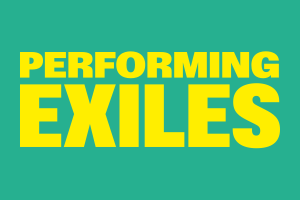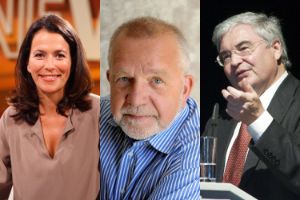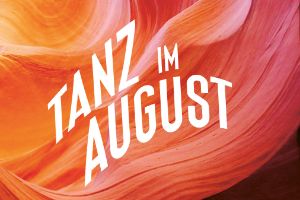
Lecture & Talk
Anne Will, Rüdiger Safranski, Karl-Heinz Brodbeck
The Art of Questioning
Introduction: Joachim Sartorius

Anne Will, Rüdiger Safranski, Karl-Heinz Brodbeck © Wolfgang Borrs, Peter-Andreas Hassiepen, Christian Ditsch
Questions are beginnings. Born out of irritation, lack or unfamiliarity. Good questions create space for new things. Questions can be tools for a conversation, they can lead to movements in thinking, to the exchange of information and arguments. Whether they are able to break through routine ways of speaking, ritualized communication and talking at each other depends on the art of asking questions. What this might be is a debate worth having: how is new thought created through the interchange of questions and answers, how does an understanding of other positions and perspectives arise? The manner in which current social problems are discussed in TV talk show debates and a mass of published interviews is almost inflationary. But are these not more like staged conversations? Experts talk and answer questions in public, audiences of millions can see that. But are they really listening to what is being said? Do discussions and controversy change views, do they actually break through established patterns of thinking about and seeing issues or do they simply consolidate entrenched oppositions? And how can we bridge the gap between thought and action?
Anne Will (*1966) is a reporter and radio and television presenter. In 1999 she became the first female presenter of the ARD Sportschau. She then spent six years presenting the Tagesthemen, for which she won a number of awards. From 2007 to mid-2011 she ran her own Sunday evening talk show, which became the most successful debate programme on German television due to her special way of asking questions. From Autumn 2011, the programme – which she produces with her own company – is broadcast every Wednesday evening.
Prof. Dr. Rüdiger Safranski (*1945) is a philosopher and writer. The impulses behind his thinking, which he says is concerned with an attempt to prevent “the decline into banality in secular times” are the great philosophical themes: truth, evil, freedom. He has written a number of distinguished biographies including works on Arthur Schopenhauer (1987) and Friedrich Schiller (2004), in addition to other books which include the collection of essays How much globalization can people take? (2003) and the study Romanticism. A German Affair (2007). Safranski has presented ZDF’s cultural conversation The Philosophical Quartet together with the philosopher Peter Sloterdijk since 2002.
Prof. Dr. Karl-Heinz Brodbeck (*1948) is Professor of Macroeconomics, a researcher into creativity and philosopher. He has raised the issue of the ethical basis of the economy and investigates the social and philosophical implications of economics, to which he has introduced a Buddhist perspective. His thesis is that it is not only a few but all of us who “create” the economy through our greed. He has written books on finance: The Rule of Money. History and Systems (2009) and economic ethics such as Profit and Morality. Contributions to an ethics of financial markets (2006). His philosophical work concentrates on epistemological problems and the circularity of their social transmission: The Circle of Knowledge. On the social process of deception (2002).
The journalist Jakob Augstein (*1967) is publisher and editor of the weekly magazine Freitag. He spent many years with the Süddeutsche Zeitung where his responsibilities included editing the Berlin pages and has also written for DIE ZEIT. He writes the S.P.O.N. – Im Zweifel links column for Spiegel online, and since the beginning of 2011 has fronted the weekly political debate programme Augstein und Blome with Nikolaus Blome on Phoenix. He is deputy chair of the board with responsibility for journalistic activity for the Rudolf Augstein Stiftung.
